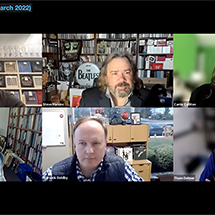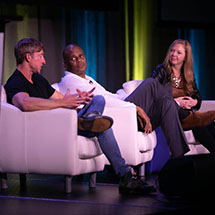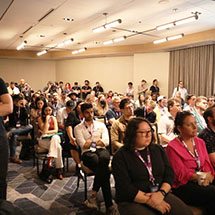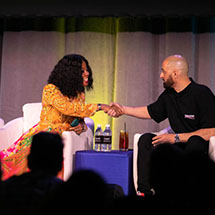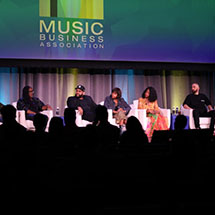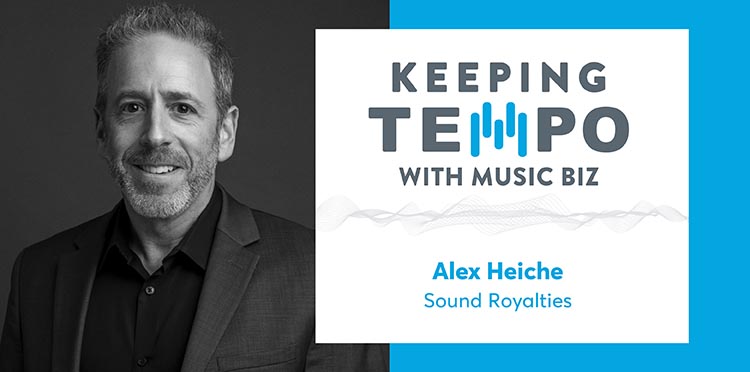
[Keeping Tempo With Music Biz] — The Ever-Growing Importance of Artist Funding Services: Interview with Sound Royalties’ Alex Heiche

More money has flowed into the music business ecosystem over the past decade, thanks to factors ranging from the rapid integration of tech solutions into our industry to the recognition of royalties as a viable asset class. This is promising for long-term growth, but it’s important that artists are receiving their fair share so there is music for the industry to operate around. This month, we talked to Sound Royalties’ Founder and CEO, Alex Heiche about his company’s place at the center of outside investment and serving artists’ financial needs, its evolution throughout its first decade, how royalty financing has transformed from concept to practice, and what the future might hold for our industry!
Music Biz: Sound Royalties recently celebrated its 10th anniversary — we’d love to hear your perspective on how both the company and the concept of royalty financing has transformed in that time.
Alex Heiche: The transformation over the last decade has been nothing short of remarkable for both Sound Royalties and the broader concept of royalty financing. In 2014, a model of fair, transparent financing without creators risking ownership of their works was foreign to the music industry. A lot of people didn’t understand it, and naturally, there was skepticism. Many assumed it was viewed as too good to be true.
We were the first to build this kind of financing solution in a way that not only protected artists’ ownership, but it also allowed for ongoing cash flow. That was a game-changer. We weren’t asking creatives to sell off or risk their copyrights or futures, which was the traditional route at the time. Instead, we focused on providing them with access to capital while ensuring they continued to earn a living from their body of work.
In the process, we had to educate the industry, music creators, and their teams on how this model works and how it serves their long-term interests. Over time, we’ve built a reputation that’s earned us the trust and loyalty of thousands of artists, songwriters, producers, and rightsholders. Today, the majority of our business comes through referrals, which is a testament to the relationships and credibility we’ve built.
Beyond that, the entire industry has evolved. Music royalties are now widely recognized as an asset class, and this has empowered creators to think more strategically about their earnings. What was once seen as a last resort is now viewed as a smart way to fuel new creative ventures, grow their businesses, and take control of their financial futures to unlock new opportunities.
Music Biz: You’ve worked with artists across all genres —everyone from indie artists just getting started to big names like El Alfa and DJ Khaled. As the company has grown, how have you been able to expand your offerings into larger deals while maintaining favorable pricing, all while allowing artists to retain their copyrights?
AH: Scaling a creative-friendly business has always been about staying focused on our core mission: giving artists access to customized financing solutions that are structured and delivered by real people. As demand grew, we built the infrastructure to support it by securing strong banking relationships. That enabled us to provide fair and flexible pricing across the board, whether someone is just starting out or selling out stadiums.
We’re constantly learning from the market and staying nimble, whether it’s adjusting to industry trends or proactively managing risk. Our goal is to keep refining both our model and creative-friendly solutions. Every funding we provide is tailored to the creative’s unique earnings profile and the risks presented, so no two deals are the same. However, our ongoing focus is to constantly evolve and become more innovative to serve creatives’ ever-changing needs.
Throughout it all, our core principle remains unchanged: artists and rightsholders retain their copyrights. That’s a non-negotiable part of how we operate.
Music Biz: Sound Royalties’ business is inherently creator-friendly, particularly given that the company’s financing model is not based on 100% recoupment. Can you explain the reasons for implementing this strategy, and how it benefits the artists you work with?
AH: We made a conscious decision early on not to operate on a 100% recoupment model because, frankly, that approach can end up being limiting to creators. When every dollar an artist earns is going straight to recoupment, they might not see any income for years, and that can be a discouraging thing when trying to build a career, support a family, or simply sustain creative integrity.
Instead, we designed our model to ensure that artists can continue to see money in their bank account on an ongoing basis. They’re still benefiting from the work they’ve put in, even while recouping an advance. That steady cash flow gives them more flexibility, freedom, and motivation to keep creating, and that’s what this should be about: empowering artists to thrive, not just survive.
Music Biz: Another aspect of your business model that is unique is that Sound Royalties recoups advances with a fixed fee over a fixed term. What does this mean for artists, particularly those looking to avoid losing a percentage of their futures?
AH: This is a fundamental distinction in how we work. When we structure a transaction, it comes with a fixed fee and a fixed term. That means the total repayment amount is clearly defined upfront. No surprises, no hidden or expanding charges, and no late fees or penalties if we underestimate the royalties.
The benefit to the creative is huge. If a work of theirs takes off or suddenly goes viral, then all those additional earnings flow directly to them. We’re not claiming a percentage of their future success and earnings. This approach gives creatives clarity, control, and upside, while still accessing the funding they need to grow. It’s all part of our commitment to transparent, artist-friendly financing.
Music Biz: Artists often make most of their revenue through tours and related merch sales. With the ever-rising costs associated with touring today, Sound Royalties’ tour financing service is compelling for those who want to make the most of their time on the road. Can you talk about how this offering came to be, and how it differs from your other services?
AH: Our tour financing emerged directly from conversations with artists and their teams about the financial challenges of hitting the road. We all know that touring is expensive. From upfront production costs, to travel, to accommodations, and staffing. Many artists don’t receive payments until they’re well into the tour, sometimes after several shows.
The hardest part financially is simply getting the tour off the ground. Once it’s up and running, it usually starts to cash flow. That’s where we come in. If there’s a guaranteed touring contract in place, we can often advance some of that money before the tour even begins. That allows the artist to focus on putting on the best possible tour without worrying about cash flow.
This service is a bit different from our core royalty financing because it’s based on those guaranteed contracts rather than on existing royalty streams. But the intent is the same: giving artists the financial tools they need to grow, without compromising ownership or taking on unnecessary risk.
Music Biz: What have been the most exciting developments in the music finance space in the past year, and how has Sound Royalties latched onto those opportunities?
AH: One of the most exciting developments has been the broader recognition of music and royalties as an attractive asset class. We’ve seen more capital come into the space along with a growing appetite for more flexible, creator-friendly deal structures. This shift has helped legitimize royalty financing as a mainstream tool, not just for global superstars and legacy catalogs, but for working creatives building real businesses.
At Sound Royalties, we’ve leaned into that momentum by continuing to evolve our offerings. We’ve expanded into adjacent income streams like touring and YouTube revenue, and we’ve strengthened our banking relationships so we can offer even more competitive pricing. Most importantly, we’ve stayed focused on building custom, creator-first solutions with live support and transparent terms, in addition to the automation we’ve already developed.
Music Biz: Outside of the music realm, Sound Royalties recently announced financing options for YouTube creators. Can you talk about the importance of this expansion for the company?
AH: Expanding into the world of YouTube and digital creators was a natural evolution for Sound Royalties. These creators often have consistent, measurable earnings but very few options when it comes to leveraging that income for growth. We saw a clear opportunity to bring our financing expertise to this growing segment of the creator economy.
There are countless talented YouTubers who have built sustainable channels with predictable income streams, yet they’ve had limited access to the financial tools that have long been available to more traditional artists. Our model helps them unlock capital based on their current projected channel earnings, without giving up ownership of their channels, content, or brand.
For us, this expansion is about meeting creators where they are and broadening our impact across the wider creative ecosystem. We’ve always been passionate about empowering creatives to take control of their financial future, and the YouTube community represents a dynamic and fast-growing part of that world, which includes many of the music creatives we already work with.
Music Biz: The blurring of international borders in recent years has opened up new opportunities to work with artists worldwide. How has the increased globalization of the music industry impacted your business?
AH: The increased globalization of the music industry has definitely expanded what’s possible for the creators and everyone who serves them. With streaming platforms breaking down geographic barriers, today’s artists can record and release music that reaches global audiences faster than ever before. That shift has created new financial needs and also new opportunities.
We’re proud to be part of that growth and currently serve creators in more than 16 countries. As we’ve expanded internationally, we’ve focused on understanding the unique dynamics of each market while staying true to our core mission: helping creators access capital without giving up ownership. Whether it’s a songwriter in Germany, or a producer in Colombia, we’re building solutions that meet them where they are to help them take their next steps forward.
Music Biz: What trends do you think will define the music finance sector in the near future?
AH: Music financing began as a high-touch, relationship-driven business. Over time, we saw a wave of automated platforms attempting to streamline the process, often relying solely on technology to assess royalty flows and structure deals. While automation has a place, especially for speed and scalability, what we’re seeing is a shift back toward the need for personalized solutions designed and delivered by real people. Creators don’t want to be boxed into a one-size-fits-all model. Especially when their careers, catalogs, and revenue streams are anything but standard.
I believe the future of music finance will be defined by striking a balance between leveraging data and AI to enhance efficiency, while still delivering personalized support that reflects the uniqueness of each artist’s journey.
Music Biz: More broadly speaking, how do you see the music industry as a whole evolving the next few years?
AH: The next few years will be shaped by rapid changes in technology, the way music is created and consumed, and how artists grow their careers. AI will play a significant role, both in the creative process and in how content is discovered, monetized, and protected. There’s still a lot to figure out, especially around rights and attribution, but it’s already clear that AI can boost productivity and unlock new creative possibilities.
At the same time, artists are diversifying their methods for connecting with fans and generating income. The traditional album-tour cycle has evolved into a multi-platform approach. From social media and streaming to sync and merch, creators are building entire ecosystems around their work. At the center of that are superfans who drive engagement, champion releases, and increasingly support artists through direct-to-fan models such as exclusive content and premium experiences.
What won’t change is the need for trusted partners. The artists who thrive will be those who understand the tools available to them and work with people who prioritize their long-term success. The pace of change is fast, but the potential is even greater.
You can read past “Keeping Tempo” articles via the portal linked here. And, stay tuned for more insightful discussions from our members and partners from across the industry!

